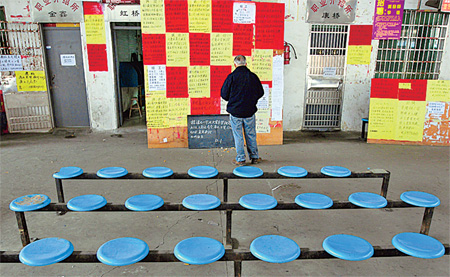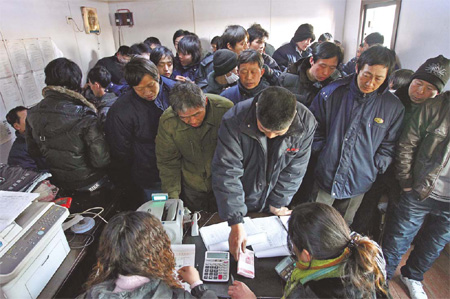Working conditions and wages improve as firms in coastal regions attempt to stave off post-festival labor shortage. Gao Changxin and Yu Ran report from Shanghai.
 |
|
Empty seats at the once bustling job market in Datang township, Zhuji, Zhejiang province, bear testimony to a labor shortage in this file photo taken in December. [Photo/China Daily] |
When workers at Orans Co Ltd returned to work at the start of the new year, they were greeted with a welcome usually reserved for visiting officials and executives.
The sanitary ware company's entire management team, including chairman Lin Huayou, lined up outside its factory in Taizhou, Zhejiang province, and bowed to staff as they arrived. Workers with parents aged over 70 were also given bonuses of 200 yuan ($30).
Factory workers receive just 1,000 to 1,500 yuan per month to toil on production lines for at least 60 hours a week, while government agencies tend to look the other way when workers' rights are infringed, according to a 2010 report by Hunan province's bureau of commerce.
However, with industries facing a repeat of the massive labor shortage that hit after last year's Spring Festival holidays, bosses are being forced to do more to keep up staffing levels.
Last February, for the first time in decades, many manufacturers in the eastern coastal regions, the powerhouse of China's economic growth, struggled to find enough cheap labor to maintain production.
Among the worst affected were those in export industries. Even when orders began to flow in again as markets recovered from the global financial crisis, operational capacities were extremely limited. As a result, factories nationwide significantly raised their salaries to attract more hands.
National Bureau of Statistics data shows that China's export volume hit $1.58 trillion in 2010, an increase of 31.3 percent on 2009. At the same time, labor costs in the largest manufacturing hubs - the Pearl River and Yangtze River deltas - rose 20 to 25 percent, Jing Ulrich, head of China equities and commodities at JPMorgan, recently told the Financial Times.
The pay hikes achieved only limited success. A study published in late 2010 by Guangdong province's bureau of human resources and social security set the Pearl River Delta's labor shortage at more than 900,000. Yet, two years ago, when the financial crisis broke, the province had a surplus of 500,000 laborers, according to official statistics.
Major cities in the Pearl River Delta - Guangzhou, Shenzhen and Dongguan - have a combined shortfall of about 550,000 workers, the human resources bureau survey found.
 |
|
Workers wait to collect their salaries on Jan 24 at a shipping company in the city of Qinhuangdao, Hebei province. Those who return after Spring Festival will receive bonuses. [Photo/Xinhua] |
Rising salaries
Millions of migrant workers travel home to the countryside for the annual lunar new year holiday (this year from Feb 2 to 8) and, every year, more choose to stay there instead of returning to work in the cities.
Guangdong, the most popular destination for the rural workforce, employed roughly 19 million people from other provinces in 2009. However, last year almost 55 percent of its laborers who went home did not return by Feb 22, nine days after the end of the festivities, according to figures from the province's human resources bureau.
"In the current climate, employers seem worried that more people are likely to stay home and are bracing for the worst," said Feng Jin, a professor of labor economics at Fudan University.
In Zhejiang, for example, Wenzhou Gold Emperor Shoes increased its workers' monthly salaries by 20 percent last year and is planning to raise them another 10 percent to about 2,300 yuan. Its salary in 2009 was 1,600 yuan. (The province's minimum wage is 1,100 yuan.)
"We lost about 1,000 workers last year and, based on our experience, many are unlikely to come back this year after the holiday," said Zheng Shili, deputy general manager of the company, which employs 8,000 workers. "We can't afford to lose any more because we're planning on expanding production."
Executives from Gold Emperor Shoes will also attend job fairs in different provinces to broaden recruitment opportunities, he added.
Juyi Group Shoes, also based in Wenzhou, is encouraging its workers to introduce friends and relatives, offering a 200-yuan finder's fee for every successfully hire. "We're really worried about what's going to happen to the labor market," admitted general manager Pan Jianzhong. "Introduction is a more effective way to find workers who are likely to stay longer. People who work with friends and relatives are happier and less likely to leave."
Salaries on offer at Andemen, one of the largest labor markets in Nanjing, capital of Jiangsu province, rose by an average of 50 percent in 2010. Yuan Liang, director of its executive office, said he predicts further hikes. "Migrant workers don't hunt for employers anymore, employers hunt for them," said Yuan, whose labor market helped fill 60,000 jobs last year.